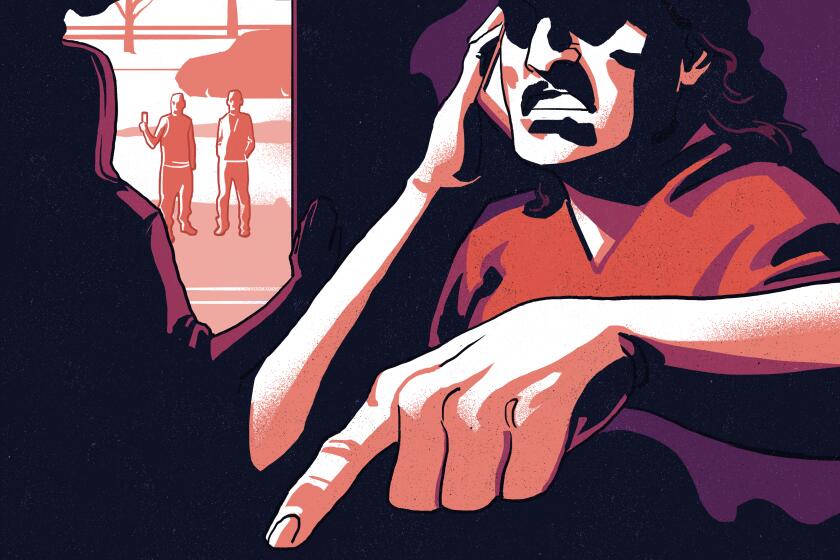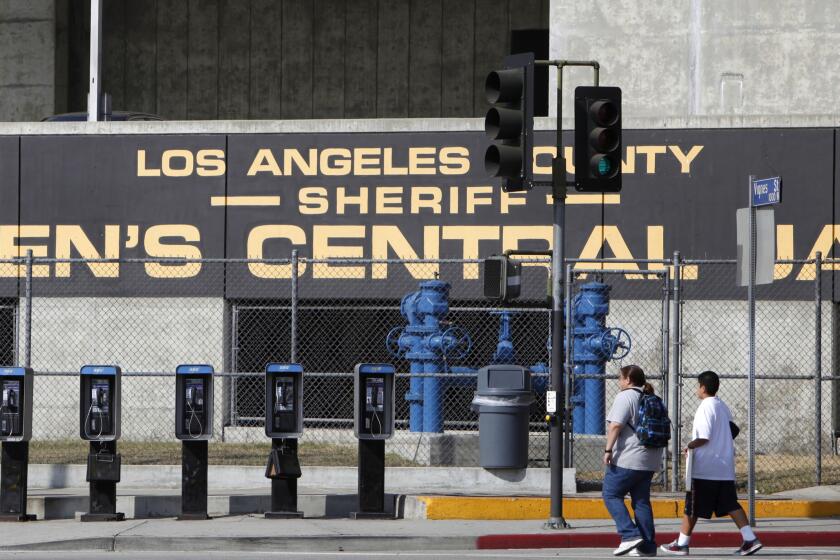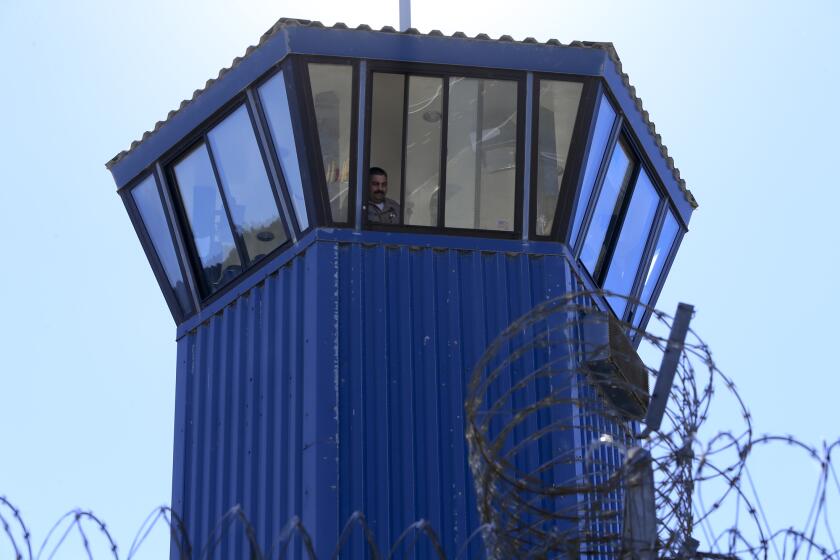Contraband cellphones, coded messages help Mexican Mafia operate in California prisons

- Share via
The business call began with pleasantries and self-deprecating humor.
“We’re just over here comparing bellies,” one man said.
“Hey, I never lost – I never could get down to under, uh, s—, 182. And now I’m at about 171,” said another, adding, “I’ve been working out.”
“Don’t mess up your knee, though, man, your leg.”
The conversation then pivoted to what sounded a lot like a murder plot.
One of the men said he’d told an underling “everything, contingencies — I told him, look, this is the way you do it. You do this, you block this, you hit this, you go this way.”
She admitted falling for a man whose embrace she had never known, who lived his days in what he called ‘paseo de la muerte.’ Death row.
“Saturday, they, they – that’s when they were supposed to go to the car show, right?” he continued. “To the car show. That’s when they were going to go. Now if they don’t make it to the car show this Saturday, homeboy from [inaudible] takes the driver’s seat.”
“I understand,” said another. “He’s going to, going to end up driving the car. He’s going to end up driving him to the car show.”
The four men on the line were members of the Mexican Mafia, held in prisons throughout California. They had dialed in using contraband cellphones, one of which had been secretly tapped. They spoke in a code they thought only they understood.
The person they were plotting against was referred to as “two T’s.” Four days after this call, Emiliano “Tonito” Lopez, a member of the Mexican Mafia who had fallen out of the organization’s graces, was stabbed to death at Calipatria state prison.
The “car show,” it appears, was code for a killing. The person “driving him to the car show” was the killer.
About two-thirds of the Mexican Mafia’s 140 members are held in California prisons, which are inundated with illegal cellphones. They use the phones to traffic in drugs, collect money and orchestrate murders, according to testimony, interviews and recorded calls obtained by The Times.
In 2022, 6,776 phones were seized in California prisons, down from 10,494 in 2019. They are smuggled in by correctional officers and “free staff” — the armies of cooks, counselors, electricians, nurses and other employees who service the prisons. Some are even dropped onto prison yards using drones, according to testimony.
One imprisoned Mexican Mafia associate told The Times the market for phones is even bigger than drugs.
A gang member was caught smuggling drugs into Los Angeles County’s main jail. He was, authorities say, just one cog in the Mexican Mafia’s lucrative operation in the county jails.
“Everybody wants phones,” he said, speaking on condition of anonymity for fear of retaliation. “Some want it for illegal activity, for sure. But some just want it to FaceTime their wife or just watch movies in the cell. Cellphones make the time go easier.”
The California Department of Corrections and Rehabilitation declined a request to interview investigators about the prevalence of cellphones behind bars. Instead, a department spokeswoman, Terry Thornton, said in a statement, “The use of contraband cell phones by incarcerated gang members and associates, including those aligned with the Mexican Mafia, is highly dangerous as they are used to communicate with other gang members and associates in prisons and in communities to further their criminal activities.”
Thornton said that “while no approach is 100 percent effective,” investigators use cell inspections, body searches, metal detectors, X-ray scanners, video surveillance and dogs to keep “a large amount of contraband” from entering prisons.
A decade ago, the Mexican Mafia associate said he paid $400 for his first phone, a Verizon Juke. Phones now go for $1,500 to $2,000, he said. An inmate at his prison cultivated a relationship with a corrupt kitchen employee, who would hide dozens of phones inside boxes of oatmeal and crackers and bring them into the prison. The arrangement was so lucrative, he said, that before the phone dealer was transferred to another prison, he sold the connection to another inmate for $20,000.
Like all illegal commodities in prison, the Mexican Mafia taxes the phone trade. In 2013, an inmate at Calipatria nicknamed Creeper used a cellphone to call Michael “Mike Boo” Moreno, a reputed Mexican Mafia member whose phone had been tapped by the Ventura County Sheriff’s Department. Creeper whined that some inmates had smuggled in 10 phones without paying taxes.
“You bring anything in here, you got to pay respetos to the homies that have seats on the yard, you know?” Creeper told Moreno, one of five Mexican Mafia members who had a claim to the prison yard. “You know, it might not be the third” — the one-thirds tax imposed on all drug sales in prison — “but you’re going to pay. You’re going to give respetos. You’re going to give something for the señores that this yard belongs to. So we’re like, look, we’re asking for at least one phone. That’s it. You got 10.”
Even worse, Creeper complained, they had already sold some of the phones and “made a gang of feria” — a bunch of cash.
“They’re going to have to kick down,” Moreno replied.
Luck runs out for Donald “Little Man” Ortiz, who refused offers of protection after being banished and marked for death by the powerful Mexican Mafia.
In prison, inmates return to their cells in the evening and guards walk the cell blocks to make sure all are accounted for. Once the count was done, the Mexican Mafia associate told The Times, he would turn on his phone and “stay up until 1 or 2 in the morning,” doing business on the phone “nonstop”: selling drugs inside and out of prison, collecting taxes from street gangs.
Mexican Mafia members involved in the drug trade once relied on people outside of prison to make wire transfers, maintain post office boxes or mail drops and send money orders. Now, the source said, they use PayPal, CashApp, Green Dot, Zelle and other online banking services on their phones to sell drugs, purchase them from wholesalers and arrange delivery through associates in Mexico.
Authorities had tapped the cellphone of Daniel “Danny Boy” Pina, a state prisoner and reputed member of the Mexican Mafia, when he got a call from a man who identified himself as Jerry.
Jerry said he was with Pina’s “hermano, Peanut Butter,” in Tijuana. Robert Ruiz, a Mexican Mafia member nicknamed Peanut Butter, had fled to Mexico after jumping bail in San Bernardino County.
“Within a couple weeks, we’re going to be, uh, we’re going to deal with it again, with some material,” Jerry said.
“Oh, OK,” Pina said. “And what are the prices? I mean, what’s —”
“OK, ‘cause — everything is cheaper if you buy it over here, you know?” Jerry said.
“No, I understand that,” Pina said. “What are the prices on this end?”
“OK, you’re talking about, uh, uh, heroin?” Jerry asked.
“I’m talking about whatever. Whatever. White, black —”
Jerry said a pound of methamphetamine could be bought in Tijuana for $1,100, plus “about $800 to cross it,” and sold in California for $2,100. A kilo of black tar heroin, valued at $26,000 in California, cost half of that in Mexico, he added.
Pina said he wanted “a sample on this end.”
“If we like it, we say, ‘OK, look. We want this,’ you know what I mean?” he continued. “So we go over there, the order’s already done. In other words, the only thing that needs to get done is the money needs to get [inaudible] and it needs to get in a paper bag and that’s it.”
Jerry agreed. “Tío right here,” he said, referring to Ruiz, “whatever avenues he has, he’s — they’re open to you. To any of his brothers.”
In another call, Pina appeared to acknowledge a lack of enforcement from the authorities, telling three other Mexican Mafia members, “Although they’re not bothering us, you can believe they’re f— investigating every single angle about us, homes, you know?”
Over the contraband phone, he added: “So we all got to be careful, man, about what’s going on, because you got a lot of us that are doing a lot of things... What we’re involved [in], we can’t keep nothing quiet. It’s not that we, we’re not trying. It’s the nature of the thing, the business, homes.”
More to Read
Sign up for Essential California
The most important California stories and recommendations in your inbox every morning.
You may occasionally receive promotional content from the Los Angeles Times.













